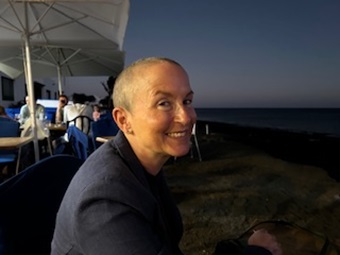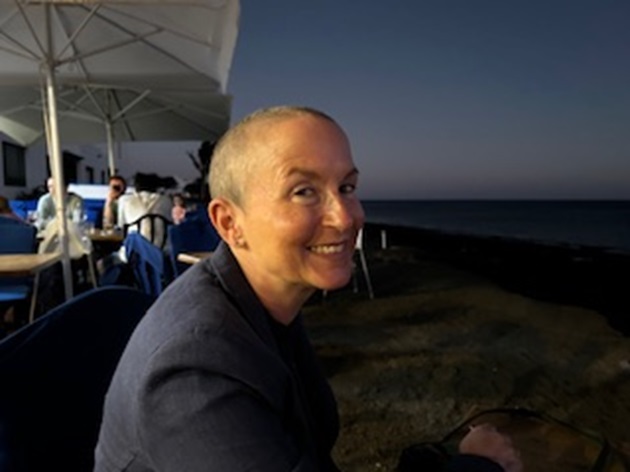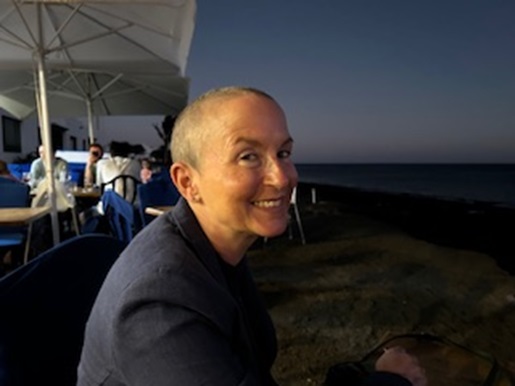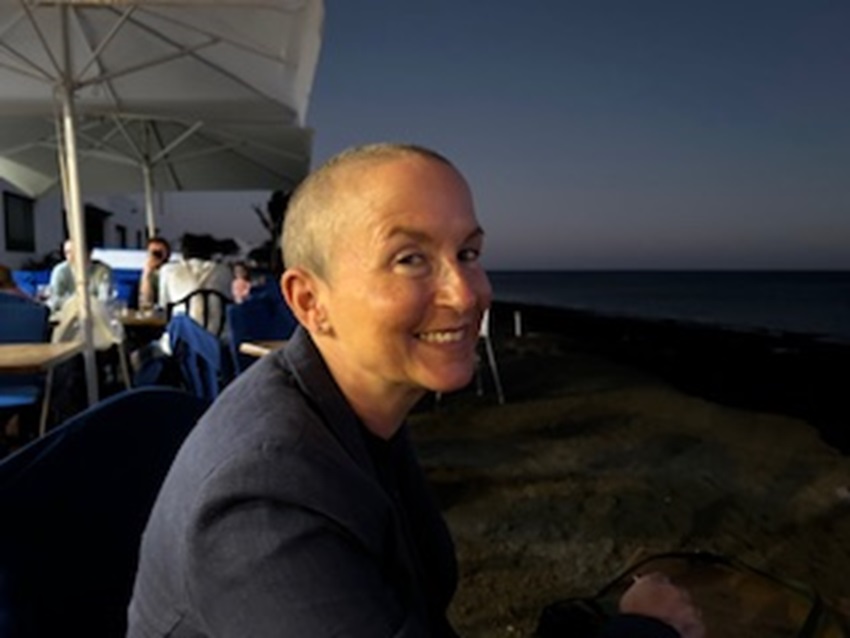Justine’s story

“I would have considered myself to be extremely well-informed about ovarian cancer symptoms because a number of risk factors applied to me, I knew what to look out for. But even so, in hindsight I know I missed things or explained them away. When I look back, I think maybe I should have taken action a little bit earlier.”
Research shows that endometriosis can increase your lifetime risk of developing ovarian cancer. Having been diagnosed with endometriosis in her 20s Justine, now 51, considered herself to be extremely well-informed about the symptoms of ovarian cancer and was having regular scans to monitor her condition. When her late mother's health declined Justine became busy balancing caring for her mother with her career and found herself delaying a scan. It was during this time that Justine also began to experience what began as subtle symptoms of what would later be diagnosed as rare, advanced, and incurable ovarian cancer.
“I’ve had endometriosis all of my life, since puberty, and this prevented me from having children. I tried IVF several times over a number of years, but the treatment was unfortunately unsuccessful, and when I was about 40 or so I kind of moved on mentally from the idea of having children, so that the sadness wouldn't 'swallow me up'. It was when I started approaching my perimenopause, around age 47, I thought I ought to begin monitoring the endometriosis. I hadn’t had it checked since my last try at IVF and I thought it would be sensible to have a look. I had a scan and there were cysts, but they were all benign cysts related to the endometriosis. The doctor said, ‘nothing to worry about’, but suggested I have a follow up scan every 12-18 months just to make sure that nothing changed, which I did.
Then around two years ago my elderly mum was dying. She was living in a granny flat in my house and my sister and I looked after her in her last weeks and days. As you can imagine, it was occupying my mind and consequently I put off the scan that was due and ended up having it late. And that was the scan where the gynaecologist said, 'actually things are changing, and we ought to remove these cysts as they might be pre-cancerous'.”
In June 2023 Justine had a Total Abdominal Hysterectomy and Bilateral Salpingo-Oophorectomy (TAHBSO) with bowel resection. Hysterectomy is a surgery to remove the uterus and cervix and “abdominal” is the surgical technique that was used. This means the surgery was performed through a horizontal incision in Justine’s abdomen. A Bilateral Salpingo-Oophorectomy is surgery to remove both ovaries and fallopian tubes. Justine’s hysterectomy and bilateral Salpingo-Oophorectomy were both done during one extensive procedure. As a result of the operation, Justine's menopause was accelerated.
“I had the operation to remove the cysts, together with my womb and ovaries, and unfortunately the histology of the tissue removed showed cancer. I had two different types of cancer in my two ovaries, one was grade 1 so not aggressive, and the other was grade 3, so aggressive and, I was told, quite a rare type.”
Justine’s doctors believed that all the cancer had been removed surgically, but as a precaution they suggested a course of chemotherapy as the cancer was aggressive and they wanted to make sure that it didn’t spread anywhere else.
Seeking the experience of The Christie Private Care
At this point Justine transferred her care to The Christie Private Care, part of HCA Healthcare UK, where her case was discussed at a multidisciplinary meeting.
A multi-disciplinary team (MDT) is a group of cancer experts which includes surgeons, medical oncologists, clinical oncologists, Clinical Nurse Specialists (CNS), radiologists, genetic specialists, and other healthcare professionals. At an MDT meeting this group of experts collectively review each patient’s case and reach a consensus recommendation for a personalised treatment and care plan based on the latest clinical evidence, best practice, and national and international guidelines to achieve the best possible patient outcomes.
An MDT makes recommendations rather than decisions, and therefore the final treatment decision is made by the patient in discussion with their lead treating consultant. MDT recommendations will propose treatment options that are appropriate for the individual patient, considering their clinical and personal circumstances.
Professor Gordon Jayson, Consultant Medical Oncologist at The Christie Private Care, is an expert in rare ovarian cancers and was a member of the multidisciplinary team that reviewed Justine's case and is her lead oncologist.
“I was pleased to be referred to Professor Jayson as he is a specialist in rare ovarian cancers. He agreed with my previous doctor’s recommendation regarding the chemotherapy, so it was reassuring to get that second opinion. He also discussed my case with other experts in rarer ovarian cancers. I really liked and admired that 'best brains' approach. I was put on two types of chemotherapy (Taxol and Carboplatin) and, perhaps unbelievably, at that stage I wasn’t fazed. I’d had a feeling I might need to have chemotherapy and I’m quite brave and pragmatic so I thought, ‘this is going to be fine, I will get through it, it’s just part of the plan’.”
An unexpected result
“At this time, when I was having my first round of chemotherapy, Professor Jayson sent me for a CT scan. ‘This is a baseline scan so that all subsequent scans can be checked against this one’ he said, which was fine. ‘All makes sense’, I thought.
It was when I went in for my second round of chemotherapy that things took a turn. I was asked to see Professor Jayson in his consultation room to discuss the results of my baseline CT scan. ‘Uh oh' I remember thinking, ‘here we go, can't be good’. And it was bad news; the cancer had metastasised to my lungs, so it was stage 4 ovarian clear cell carcinoma with what he described as trophoblastic mutation. Also, it looked like there was some cancer left in my abdomen and peritoneal cavity which hadn't been evident, and so not removed, at the time of surgery.”
Clear cell ovarian cancer is a rare type of ovarian cancer that can be linked to endometriosis and is generally categorised as a more aggressive type of cancer that tends to grow and spread quickly and can become chemotherapy resistant.
A personal approach from Professor Jayson
“Professor Jayson has been marvellous. He’s able to read what you want and need from him and responds to your approach, how you want to be treated. I’ve been clear with him from the start that I am the kind of person that wants the truth, the facts about what I am dealing with, so he has been honest and upfront about my prognosis, which I appreciate. He works with Rachel Esfahani, my Clinical Nurse Specialist, who is incredibly supportive – no question or concern is too small. I have great team behind me.”
Explaining away the symptoms
“I had been having symptoms prior to my scan but I was grieving the death of my mother, recovering from that, so I wasn’t giving it a lot of thought and my mind was elsewhere. But even though I had my scan later than I should have, it was a matter of months, not years. Who could have imagined it would make a difference? Of course, now I wish I’d had it six months earlier, when the symptoms started. But I must tell myself not to look back.
The symptoms started with bloating, and I was getting very bloated, particularly when eating. Whatever I ate my stomach would become like a drum. So, because eating made me feel uncomfortable, as a consequence I was getting very slim, and although I’d always been slim, I was the lightest I’d ever been. But I explained the weight loss away, I just thought ‘oh it’s because I run a lot, I do a lot of exercise’.
I also started to get intermittent, sort of dragging abdominal pain which felt a bit like period pain, but again I explained this away because it generally happened when I was doing something tough or exercising, like climbing a mountain or something else physically challenging.
The list goes on I’m afraid - I’d also started to have some urinary symptoms, particularly with urgency; again, I put that down to something else, to being peri-menopausal.
So, there’s no doubt that even though, as I say, I was certainly alive to ovarian cancer because I’ve had endometriosis and haven't had children, even I unfortunately left things longer than I should have.”
Don't be embarrassed
Justine is keen to encourage others not to be embarrassed about symptoms, no matter what they are.
“I believe that one of the things that delays women from seeing their doctor is that some of these symptoms are a little bit embarrassing.
For me, in addition to the urinary symptoms, I was experiencing some bowel symptoms which I was particularly embarrassed about – basically needing the loo more urgently than previously. I blamed it all on the onset of menopause, but I should have taken it more seriously. It’s funny because I’m usually the least inhibited person in the world and have always prided myself on the fact that that I’m able to talk openly about most things. But because it was bowel related, even I was reluctant to discuss it. And of course, I wish I hadn’t been.”




Taking care of yourself as well as others
“I think my story highlights another common problem. It’s often when you’re caring for somebody else that you don’t take notice of yourself. I saw it with my parents. My dad was poorly for many years and my mum was very focused on him and caring for his needs. A month after my father died, aged 77, she was diagnosed with breast cancer. As it turned out, she was treated and lived for another 13 years. But I think with both her and me, we took our eye off the ball. She did so because she was caring for my father, and I took my eye off the ball because I was taking care of her with my sister, and then dealing with her death.
It can be true of men and women of course, but perhaps it happens more often with women, that they’re looking out for other people; caring for children or elderly relatives. It’s difficult, but I would advise people to try and remain mindful of their own health and their own needs even when taking care of others.”
A new perspective
“Luckily, I’m a very positive, very cheery person, which I’m hugely grateful for because how would I cope otherwise, I don’t know. People are surprised that I have stayed this cheerful but that’s not me being ‘amazing’, it’s just in my genes, I guess. Of course I do have some awful days, but basically, I’m just getting on with it.
My life was totally changed in that moment. Not being able to have children changed my life, getting married changed my life, having a hysterectomy changed my life, but the whole way you think about life changes even more radically in that moment you are diagnosed with terminal cancer.
I gave up day to day work in early 2024 to focus on family, friends, and pleasure. I’ve not resigned, I’m still a partner in my law firm, but my priorities have certainly shifted.
It’s a cliché but I’m enjoying the small things, small pleasures in life, and I’m only committing to doing things I like; whereas a couple of years ago if I didn’t want to do something I may have said, ‘OK fine, I'll do it’, now I don’t. I do what I want to do.
I’m exercising (even running sometimes), my skin is good, my hair is growing back, and I am dancing when given the opportunity. Oh, and I am certainly laughing.
I remain grateful for the excellent care of Professor Jayson, the Christie Private Care nurses and team for my maintenance therapy and am taking each day as it comes.”



